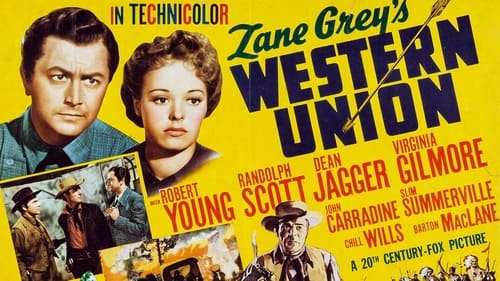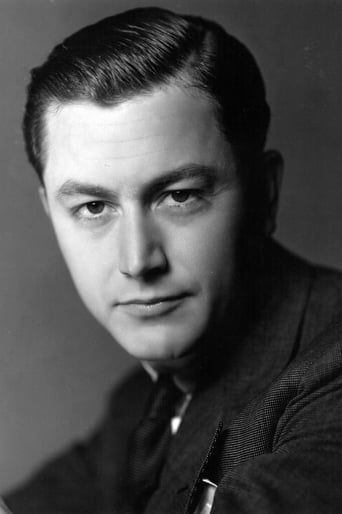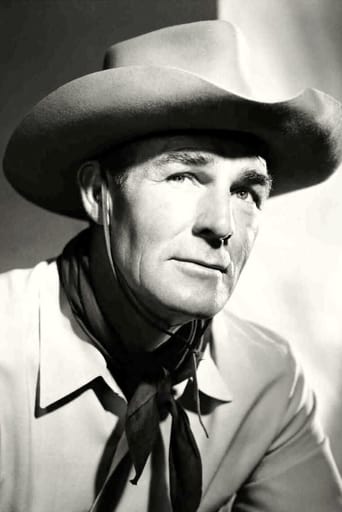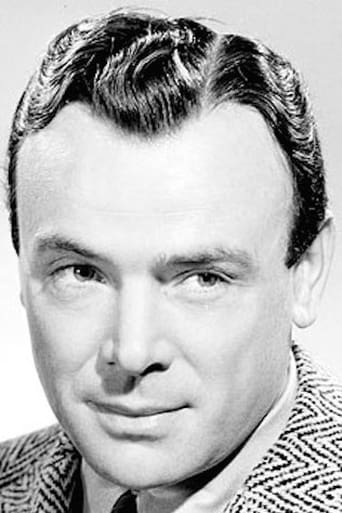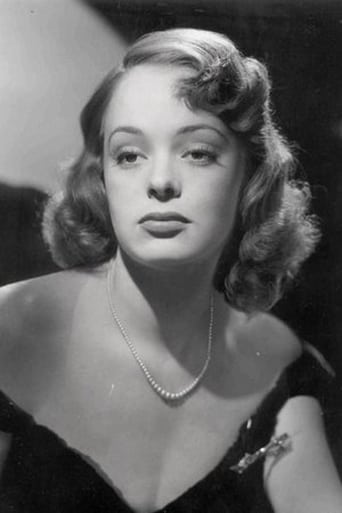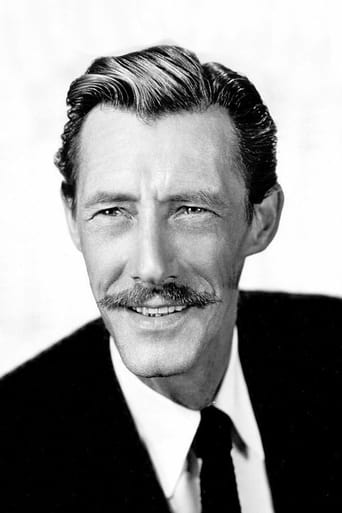ThiefHott
Too much of everything
Stevecorp
Don't listen to the negative reviews
Jenna Walter
The film may be flawed, but its message is not.
Raymond Sierra
The film may be flawed, but its message is not.
Alex da Silva
Randolph Scott (Vance) is an outlaw trying to make good. He abandons his old gang and finds a job working for the Western Union company under the lead of Dean Jagger (Creighton). Joining him in his new employment is new recruit Robert Young (Blake). Both take a shine to Virginia Gilmore (Sue) who works for the company. She is Jagger's sister. As they go about their work of setting up a telecommunication system across the land, they encounter hostility from Scott's old gang, headed by Barton MacLane (Jack). And the Indians don't seem too pleased about things either.This film looks impressive in technicolour. It is definitely a bonus. The story is all rather humdrum, though. The only real interest in the first half of the film comes from the comedy sections between Scott and Young as they compete for the affections of Miss Gilmore. Hardly gripping. Talking of comedy, there is far too much with a special mention going to the very unfunny cook that is Slim Summerville (Herman).In the second half of the film, we finally get some action sequences – including a very badly acted drunken Indian – but it's nothing that hasn't been seen before. Something of concern that kept revealing itself throughout the film was the incestuous relationship between Jagger and Gilmore. They needed to get a room!
Errington_92
Fritz Lang is better known and regarded for his work in German Expressionism and Thrillers. Films such as Metropolis, M and The Big Heat are some of the impressive works that asserted Lang as a major presence within cinema history. Yet I feel more of his lesser – acclaimed work should be discussed. One such film being Western Union, a western full of character and dynamic situations.The main plot line focuses on the beginnings of the Western Union, a company setting up telegraph poles across the west in order for faster communication to the east. This shows the building of modernisation in an area which was still untamed. It is spearheaded by Edward Creighton (Dean Jagger) who's happy at the fact that his dream is materialising. But Western Union is not solely about one man and his dream of modernisation. In fact the main plot line sets itself as a juxtaposition of change which the main characters want to happen within themselves. This desire for change fuels the drama in the film's narrative. This is first shown with Vance Shaw (Randolph Scott) who works as the deuteragonist throughout the narrative. He goes from being moraless to a man of kindness after finding Creighton injured. At first Shaw questions his sudden change in character, muttering to himself he's like Santa Claus. But Shaw soon amerces himself into the role of the good guy by working alongside Creighton for Western Union. Shaw's desire for change creates personal conflict within himself and his old accomplice Jack (Barton MacLane), who along with his gang attempt to use Shaw in their intention to destroy the telegraph poles for the confederacy. Although this is not historically accurate, it enforces the juxtaposition of change. Shaw wants to change for the better whilst his old gang want to aid the confederacy in their own quest for change in America. We also see a desire of change in Richard Blake (Robert Young), a young eastern man from an established family trying to prove himself as the opposite of a tenderfoot as he is referred too.A significant scene of Blake transforming his image is when he is challenged to ride the most stubborn horse from the stables. Dressed in western style attire he brought from the east it creates the notion that Blake is acting pretentious for the real citizens of the frontier. Yet after huge resistance from the horse Blake manages to assert the horse to his control. This scene shows the enhancement of change not only in Blake's personality but also in the opinion of others, most importantly Creighton's sister Sue (Virginia Gilmore). Impressed by his skills this creates a love triangle between herself, Blake and Shaw which is not only works as a comical aspect in the narrative but also a way of Blake and Shaw trying to prove themselves to Sue which relates to their own personal changes. However in attempting to change it results in Blake and Shaw being marred into tragedy. When up against a group of drunk Indians Shaw does his best to diffuse any tension without resorting to violence. However Blake, still inexperienced and wanting to prove himself to others goes for his gun and shots an Indian dead. Blake's actions against the Indian show his eagerness to change into a more masculine figure but at the cost of an unjustified death. However when Blake next resorts to his weapon, it is not only justified but concludes his transition from inexperienced easterner to a masculine westerner.After destroying the majority of Western Union's goods Shaw seeks revenge by having a shoot out with his old gang. This results in tragic consequences for Shaw who redeems himself at the cost of his life. This is when Blake arrives to seek justice by gunning down Shaw's killer Jack in a one on one shootout. On the surface it comes off as a typical western finale, the heroic figure triumphing over evil. But deep within it concludes Blake's transition, no longer the tenderfoot everyone thought he was.Western Union sums up the transitions of change as a fruition of a better future. Creighton's plan of modernisation is complete along with Blake's new experience benefiting his life from there on in. Even if Shaw's transition ended in his death it certainly was not in vain, "It's a long way from Salt Lake City to Boot Hill in Elkville, but I think he can hear it".
OldAle1
Lang does Hawks as well as Hawks does in the first part of this extraordinary Western, before settling down into typical deterministic, dark and guilt-haunted Lang for the finale.This is one of those films that shows its greatness almost instantly but at the same time very subtly. Vance Shaw (Randolph Scott) is on horseback and being pursued, we know not why -- he stumbles on wounded Edward Creighton (Dean Jagger) and decides to take his gun and horse, but discovering that Creighton is in a bad way, decides to fix him up first. This is conveyed mostly through facial expressions and very brief, clipped dialog - in 2 minutes we know that Shaw is an outlaw, but basically a good guy. Shaw ends up helping Creighton on his way to civilization, then disappears.Cut to a few weeks or months later, with Creighton on the mend and in charge of an expedition to lay telegraph wire going west from Omaha. He hires Shaw as a scout, who tries to leave when he finds out that Creighton is in charge; but Creighton wants him anyway, repaying a debt and sensing something quality. Also hired is a tenderfoot, son of a benefactor of the project, but atypically the Easterner Richard Blake (Robert Young) is quite competent as he shows right away in an amusing but exciting bronco-busting sequence. Both of the hires vie for Creighton's sister Sue (Virginia Gilmore) who - again not typically - seems quite as able to take care of herself as any man. The camaraderie between the three men, the comedic elements involving an unwilling cook and various rough and tumble types, and the wonderfully played light romantic elements dominate the first third of the film and reminded me more of Howard Hawks' "Red River" or "Only Angels Have Wings" than most Lang - but they are so well played and the action progresses so naturally that it doesn't matter, and doesn't alter our pleasure - if it does perhaps change our expectations - as the more usual Langian themes of the haunted past, dark secrets and the immense pull of the easier, destructive and evil ways come to dominate the later part of the film. Shaw's old pals come back to haunt him as the the wagon train and its wires move westward; attacks mount on the crew, and Shaw has to wrestle with what, if anything, he is to tell Creighton about his tortured relationship with Jack Slade (Barton MacLane), leader of the outlaws.Beautifully shot in early Technicolor and moving fairly seamlessly from sound stages to western locations, this is for my money easily Lang's best western and one of his very best films, conveying as potently as any of his films the tragic inability of men to escape their pasts and build a new future. Scott is as good as I've seen him, showing more with a flick of an eye than a lot of actors can do in a paragraph of dialog, and the rest of the cast is uniformly fine. The inevitable showdown between Shaw's past criminal life and his potential future is extraordinary, and a surprise even for a longtime Lang devotee such as myself; and even in 1941 it seems there was no place more fraught with meaning on the margins of civilization than the barbershop and the dusty street outside. You can get a shave, you can feel like a new man, but you can't really ever be one as long as the old ties are still holding you back.Genius.
MartinHafer
This Western was set in 1861 and had to do with the creation of the first transcontinental wireless lines that were laid by Western Union. While nice guy Dean Jagger (sporting lots of hair) did his best to get this done, there was a bad guy just waiting to undo this for his own selfish reasons. So, it's up to either Randolph Scott or Robert Young to save the day.This is certainly one of the better 1940s Westerns I have seen and it nearly garnered an 8--it was that good. However, for the life of me, I have no idea why Fritz Lang was assigned to direct this film--after all, he knew nothing about Westerns. His forte was drama--and I guess this movie is a drama of sorts--just set in the old West. Strange, yes, but it seemed to work out okay, though I wonder how this great German director felt about being given this job.As for the rest of the film, it's exceptional--with vivid color, great location shooting and very good acting. As usual, Randolph Scott put in another relaxed and realistic performance. I was surprised, though, with Robert Young being also cast in the film, but it was a good casting decision--he was supposed to be a Harvard-educated Easterner. When I saw Barton MacLane was also in the film, I pretty much assumed he'd be the "baddie" and my thoughts were well founded, since he made a career out of playing jerks! As for the script, it seemed pretty ordinary for the most part, but the final showdown between Scott and Barton MacLane was a lot better than I'd hoped--making this movie ending on a very high note.

